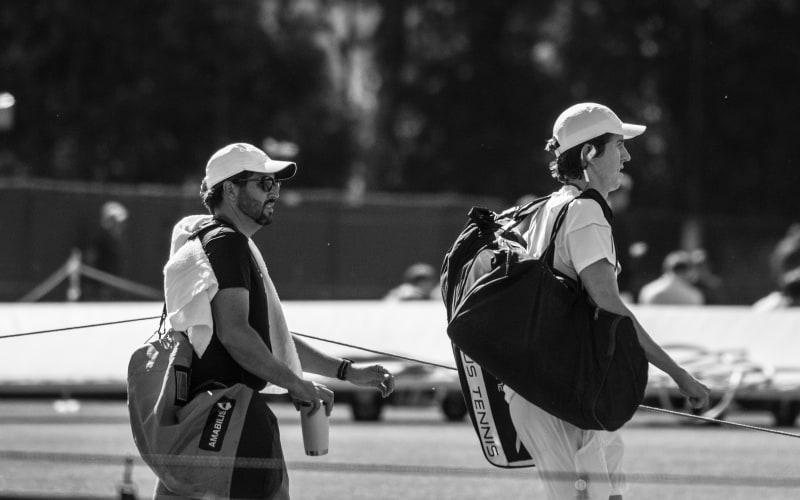There are many different types of tennis coaches. Some specialize in teaching beginners and young children, while others work almost exclusively with adult club players. A substantial number work with performance players, either in clubs or at colleges, while a few earn big money helping top players on the ATP and WTA tours.
Whichever type of coach you aspire to be, there are organizations that will train and certify you. This ensures that you will know what you are doing when you begin work, as well as providing reassurance to your customers. So, what is the best way to go about becoming a tennis coach?
To become a tennis coach, you must have the right background and qualifications, and get the necessary certification from two of the main governing bodies. Tennis coaches do not need to have a degree, although it might be helpful to have one. One of the most challenging aspects of becoming a tennis coach is finding students.
Do You Need A Degree To Become A Tennis Coach?
A good education is very helpful to any tennis coach. If you aim to work with performance players, an understanding of biomechanics and psychology will be extremely useful. Even if you work primarily with adult club players, many of these will be highly educated, and it will much easier to build a rapport and expand your business if you can converse with them on subjects other than tennis.
Having said all of this, a degree is not necessary for the vast majority of coaching jobs, with the only possible exception being roles at certain colleges where, as degree providers, they might regard possession of such a qualification as essential if you want to work there.
Obtaining The Proper Certification (USPTA, ITF)
USPTA Certification
There is an established pathway to follow, depending upon how advanced a qualification you aim to obtain. The three principal levels of coaching qualification are:
Tennis Instructor
This is the most basic level of qualification which will start you on your way to becoming a tennis coach. A number of online courses need to be taken and completed, along with a 2-day workshop entitled ‘Teaching Essentials 1’. This qualification enables you to begin teaching, and makes you eligible for the USPTA’s liability insurance.
Professional
This is the main level of certification for anyone who intends to teach tennis as a full-time career. The training is more detailed than that required for a Tennis Instructor (although that qualification must be obtained first), consisting of 12 online courses, six one-hour webinars, and a three-day face-to-face workshop focused primarily on the teaching of groups.
Master Professional
This is the highest level of certification offered by the USPTA. To be eligible, you must have been coaching as a Professional for at least 10 years, as well as having completed 80 hours of specialist courses. You will also need to submit a portfolio detailing evidence of your accomplishments.
ITF Coach Education
It is also possible to undertake coach education courses and obtain certification via the International Tennis Federation. The primary aim of these courses is to train coaches in countries that do not have a well-established domestic coach education framework. Nonetheless, if you want a truly international qualification, the ITF courses are worth considering. Each course prepares you to work with players whose standard is measured by their International Tennis Number (ITN).
Play Tennis Course
Enables you to work with beginners (ITN 10) and young children. The course requires at least 32 hours of tutor contact.
Coaching Beginner And Intermediate Player Course
Allows you to work with players up to ITN 6, and requires 80 hours of tutor contact.
Coaching Advanced Players Course
Prepares you to coach players of up to ITN3 and needs 80 hours of tutor contact.
Coaching High Performance Players Course
Provides you with the knowledge required to work with players of the highest ITNs, up to 1, and requires 88 hours of tutor contact.
How Long Does It Take To Become A Tennis Coach?
Initially, you will need to ensure that your own playing standard and technique is adequate to allow you to coach the level of player you want to work with. This can take some time if you do not have a strong playing background. Once this is achieved, it is all about completing the relevant courses and obtaining certification.
Under the USPTA pathway, if you can find a convenient Teaching Essentials workshop it should be possible to qualify as a Tennis Instructor within a few weeks. To become a Professional requires six months of practical coaching experience alongside the completion of a large amount of online study. A Master Professional needs to have been coaching for at least 10 years following qualification as a Professional.
The ITF pathway requires set amounts of tutor contact, but, even if you can arrange this quickly, experience is vital, so it would be sensible to allocate at least 6 months to progress from one level to the next, and probably more for the higher ones.
Tennis Coach Salary & Costs
Your expenses will depend on whether or not you are self-employed. Employed coaches will normally get free court time, balls and equipment, whereas self-employed coaches must pay for these, along with any travel costs. There are several estimates of the average salary for a tennis coach in the USA, in the range $40-50,000 p.a.
How To Be A Good Tennis Coach
Whole books have been written about this, but essentially you need to keep up to date with the latest developments in teaching methods and techniques, as well as ensure that you understand sports science and psychology. Most importantly, you need to create a healthy learning environment for your students, ensuring that they remain positive and motivated.
Final Thoughts
Coaching can be a great career. It can offer good money for some, but in any event, it provides a great working environment and enormous job satisfaction.

